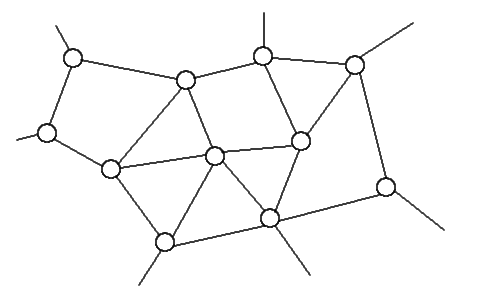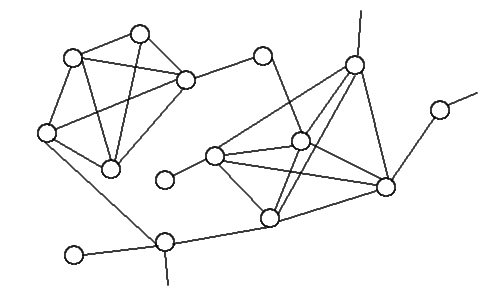|
Stardate
20020425.1351 (Captain's log): I think that the original concept of the web itself, and of web logging in particular, was that it would be heavily cross-linked and rather diffuse, like this:

But like the early universe, clumps have begun to form, knots in the web (if you will). People don't link at random, they tend to link to others whose interests are similar, and so you start getting concentrations which are heavily cross-linked but which only have a small amount of linking to each other:

As a result, when you wander from site to site by following their links, you tend to wander within something of a corral. You have to be somewhat lucky to find a link outside the cluster which might lead you to another one, since the majority of the links are intracluster.
I write this because in the last few days I became aware of one I didn't know existed, and that raises the number I'm aware of to five. I'm sure there are many others.
The original bloggers (they think) are the A-list. These people's primary subject matter is the web itself, its variety and its potential; they're heavily into locating cool stuff on the web to link to, and to discussions of the potentiality of the web as a medium. Sites in the A-list cluster tend to be very heavily over-designed and are probably more graphically varied than any other cluster.
The A-list are responsible for many of the tools that other web loggers use. In particular, A-listers created Blogger and Manila and Greymatter and Movable Type. (They did not, on the other hand, create the tools used at LiveJournal or CollegeClub.) Typical core members of the A-list are Kottke, Haughey, Williams, Zeldman, Winer and Blood. For the A-list, blogging is a new art form, a new medium, something of a revolution. If you see an interview with someone who says that blogging is going to change the world, odds are that they're A-list.
One of the early offshoots of the A-list was the Gay underground. (That's my name, by the way. I have no idea what they might call themselves, if they have a name at all.) Gays are used to networking with each other anyway, and they seized on this medium early on and started using the A-list's tools to form their own cluster concentrating on Gay issues, and generally to keep in touch. An examples of this cluster is Christopher Street. (I'm not very familiar with this cluster and don't really know what the core sites are.)
For the Gay Underground, the web is a way to network across continents rather than just within cities. They're already into clustering (e.g. SF, the Village) so this is nothing new. The web is viewed as a communication medium by the Gay Underground.
Then you have the warblogs. We're about politics, mainly. A lot of the core of this cluster is actually pro journalists, some of whom also thought they invented blogging (which they, for a while, were calling "me-zines", only to be informed that they were latecomers, and where did they think all those tools came from, anyway?). You got your Reynolds, and your Welch who are pros, and your Johnson, and your Green. (And me! Amateurs, the lot of us.)
For the most part, the formatting of war blog sites tends to be cookie-cutter; they're mostly using premade formats inherited from the A-list. One tends to have a strong sense of visual deja vu wandering from site to site. They tend to be highly polarized and opinionated, and are outward looking; the web is a tool for them, not the end in itself. It's a way to communicate about larger issues. In a sense, to the war bloggers, the web is a new form of publication, an augmentation of the function performed by magazines and newspapers. Warbloggers are the new pamphleteers.
Because of warblogging's heavy links to the professional media, this cluster, although relatively new, is the one which has gotten the majority of the press coverage recently. (Much to the resentment of the A-list. I myself have been mentioned by the Washington Post and the Wall Street Journal.)
An entirely different cluster is known as E/N (their own name, which stands for "everything/nothing"). For E/N the web is the electronic equivalent of hanging around at the mall. E/N bloggers tend to be young, and their sites are often highly personalized. They can be graphically quite complex, indeed, but though there may be linking going on, the primary emphasis (at its best) is on talking about self and personal experiences. It's a form of sharing, kind of like chatting. To the E/N bloggers, the web is sort of like a distributed form of telephoning your buddies, a way of socializing. A couple of E/N blogs I like a great deal are CrackerJap and WankerCounty.
Understand that these are extremely simplified descriptions, and that most sites are exceptional in at least some ways. What I'm describing are paradigms, the idealized center of the cluster. No-one is actually standing on that precise point. For instance, I describe E/N as primarily being teenagers and young 20's, but one of the contributors to CrackerJap is Gramps, who's about my age and is literally a grandfather. (But he's young at heart.)
And there are also sites which straddle the line, or defy categorization. Iain Jackson's Grim Amusements is sort of halfway between the warblog cluster and the Gay underground, and links heavily to both. My site talks a lot about politics but I'm also a technogeek. (If there's a technogeek cluster out there, I don't know about it.)
The new cluster I just stumbled on is the Catacomb (my name). It's Christians, concerned with issues of religion and how it affects life and politics and things like that. Some examples of this cluster are Amy Welborn and Eve Tushnet and Mark Shea.
This is a plastic medium, of course, and there are variants on the theme. There are, for instance, public-participation fora where members of these groups meet. In some cases you start getting deep disagreements which can become very angry. MetaFilter was originally a group-blog in the A-list cluster, but as time has gone on it's taken on a much more political bent, and that has inspired comments of the form, "But you're doing it wrong!" The A-list doesn't want to talk about politics (and they especially don't seem to want to argue about it); they want MetaFilter to be a collection of the grand and glorious they've found on the web, sort of the distillation of the A-list philosophy of what web blogs are. The result has been something of a guerrilla war to try to drive out the infidels, and with outright pleas for a moratorium on political discussions.
A lot of the disagreements between these groups tend to the religious, and by that I don't mean "christian". The A-list, in particular, often have a kind of contempt or disgust for the war bloggers. Not only do the war bloggers have the wrong politics (the A-list tends to extreme liberalism; if it was left to them, Nader would be President of the US now) but they also see war blogs as a perversion of the medium. It's just not what blogs should be for. (This is obviously a generalization and this opinion is not held universally, by any means.)
The E/N crowd see the A-list as a bunch of stuck-up overeducated elitists; the A-list sees the E/N crowd as a bunch of punk kids. The War bloggers tend to look at the A-list as being unrealistic, idealistic, and out of touch. The effect of all this is to cut way down on the amount of cross-cluster linking; why should I route my readers to THOSE sons-of-bitches? Let 'em find their own readers.
What occurred to me is that blogging actually grows out of Usenet, online news groups. Blogging appeals to the same kind of people who used to participate heavily in netnews. But blogging is in some ways an improvement, and in some ways not.
I was involved in netnews in the very early days, around 1980. Back then the number of participants was very small, probably less than a hundred thousand if even that many. It was just beginning to fractionate into interest groups, with rapidly proliferating news groups concentrating on specific subjects. (There was a time when I read news article posted to all groups. No-one can do that now, of course. It's impossible even if anyone were inclined to try.)
The advantage of NetNews was that it was a single stream; it was inclusive; you could post your message and know that pretty much everyone else participating would see it. But inclusiveness was also the disadvantage, because it meant that you'd soon be flooded with messages written by idiots and unpleasant people, and by trolls.
Blogging has many advantages over netnews. Among other things it provides far more capability to format and present your message in unique and valuable ways, though this can be taken to ridiculous extremes. And since you get to choose what you read, you can much more easily ignore discordant voices. The big disadvantage of blogs is finding them, and for the writers the disadvantage is finding readers, and to some extent that's why the clusters formed. The links tended to be of the form, "If you like my site, you'll probably also like these here." Just putting a new site out there, then, becomes an exercise in futility because without links to it no-one will find or read it. And thus people who are inspired to try to join a cluster are reduced to writing to those already in them and begging for links. (I receive my share of these.)
The big advantage of NetNews was that a new participant found a ready-made audience. You posted and all those already participating in the group would read what you said.
But on balance, the advantages of blogging far outweigh the disadvantages and that is why it is growing (and, just incidentally, netnews is starting to peak).
But that suggests that there are probably other clusters out there. Pretty much any collective interest which used to spawn a news group has probably spawned a blog cluster now. For example, I suspect that there's a Mac-lovers cluster out there, and probably one for dog-lovers, and I have no doubt at all there's a Jewish cluster, and a bird-watcher cluster, and weaving clusters, and likely dozens or hundreds more. Some clusters will form simply because they're circles of friends, not because they necessarily have a subject in common. By the nature of this medium, there's a sort of blog gravitation that tends to make clusters form.
Perversely, this has two effects. If you find a member of such a cluster, it makes it easier to find others in it. But it also makes finding the cluster difficult in the first place because there's less cross-cluster linking going on. It never occurred to me until a couple of days ago that anything like The Catacomb even existed.
Update: Brian Tiemann comments.
Update: Bruce Baugh says that there is indeed a Mac-loving cluster. (God help us.)
Update 20020426: The participants at Metafilter react.
Update 20020428: Dr. Weevil comments.
Update 20020429: Max Power comments.
include
+force_include -force_exclude
|